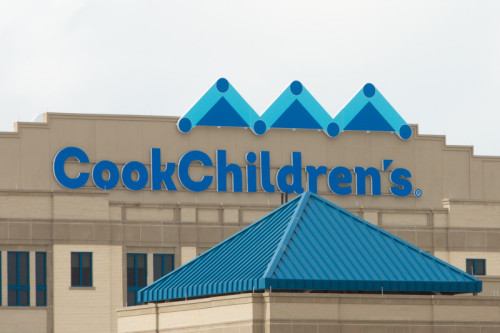Cook Children’s Sees Spike in RSV Cases
High numbers of patients seek treatment at Emergency Department and Urgent Care centers.
By Jean Yaeger
Respiratory illness is on the rise, causing a jam of patients at the Cook Children’s Emergency Department (ED) and Urgent Care locations.
In the last 24 hours, our Urgent Care sites across North Texas saw 731 patients, many with respiratory syncytial virus (RSV) and other seasonal illnesses. That compares to 684 visitors the previous day.
At the same time, our ED was treating 524 patients, up from 448 one day earlier. That’s nearly a patient checking in every three minutes. 
Swabs for the virus came back positive on 29% of the 834 patients who were tested at Cook Children’s Medical Center – Fort Worth during the week of Oct. 29-Nov. 4. That’s an increase from the 25% who tested positive for RSV one week earlier. Numbers for COVID-19 and influenza, meanwhile, are running much lower at the current time.
RSV is a common respiratory virus that usually causes mild, cold-like symptoms such as runny nose, cough and fever. But it can be serious when it turns into bronchiolitis and pneumonia. RSV sends anywhere from 58,000 to 80,000 children under 5 years old to the hospital each year, according to the Centers for Disease Control. Infants are particularly vulnerable if they were born premature or have weakened immunity or heart or lung conditions.
Our ED and Urgent Care centers are crowded, and wait times are longer for non-emergency illnesses and injuries. How do you know if your baby with RSV needs medical attention – and where to go? The doctors at Cook Children’s have answers.
Your Pediatrician
Go to your primary care physician if your child is experiencing mild respiratory symptoms but is not having difficulty breathing. Your pediatrician can test for RSV, COVID or the flu.
Jonathan Nedrelow, M.D., associate chief medical officer for the Medical Center, said infants should be seen by a doctor if they’re struggling to breathe. Watch for faster breathing than normal, flared nostrils, airway congestion, wheezing or a rattle you can hear or feel in their chest. Other concerning signs are excessive sleepiness, lack of appetite and trouble feeding.
“If parents notice their infant’s breathing is hard or labored, they need to be evaluated,” Dr. Nedrelow said. “RSV is not the only virus that can cause these symptoms, so it’s good to be checked out.”
Urgent Care
If you can’t get in to see your child’s primary care physician for mild difficulty breathing or wheezing, then Urgent Care is the next best place to go, said Kara Starnes, D.O. medical director of Cook Children’s Urgent Care Services. Decreased fluid intake (not as many wet diapers) is another sign to watch for.
“There is no medication to treat RSV,” Dr. Starnes said. “Treatment for mild to moderate RSV involves frequent saline and suction of the nose and supportive care for fever as well as increased fluids. Cough and cold medications are not recommended.”
Virtual Care Visits
Cook Children’s primary and urgent care locations both offer virtual visits that can be accessed from the comfort of your home. Cook Children’s Virtual Care appointments can help you avoid packed waiting rooms and allow you to see a physician at your convenience. This is also a great option if you need a doctor’s note for school. Visit our website to learn more.
Hospital Emergency Department
Call 911 if your child is having severe difficulty breathing, is turning blue or has become lethargic. Don’t seek RSV treatment at the ED unless you see signs of struggling to breathe, such as the muscles sucking in between the ribs, or if your child can’t stay hydrated.
“If your child has mild symptoms such as cough, congestion, or low-grade fevers, we recommend following up with your pediatrician or urgent care, please do not come to the emergency department,” said Taylor Louden, M.D., in pediatric emergency medicine at Cook Children’s.
Severe cases of RSV typically need supplemental oxygen until the virus runs its course. IV fluids may also be necessary.
Preventing RSV
RSV season typically runs from October through early spring. These steps help avoid catching the virus or passing it along:
- Wash your hands frequently
- Cover your sneezes and coughs
- Stay home when you’re sick
And a new antibody-boosting injection, called nirsevimab, helps prevent severe RSV by providing a temporary boost to the immune system. The medication is in short supply nationwide, and available doses are reserved for patients at highest risk. Additional doses are on order at Cook Children’s, so check with your pediatrician for availability.
RELATED STORIES:
About Cook Children's
Cook Children’s Health Care System embraces an inspiring Promise – to improve the health of every child through the prevention and treatment of illness, disease and injury. With more than 60 primary, specialty and urgent care locations, families can access our top-ranked specialty programs and network of services to meet the unique needs of their child. We combine the art of caring with leading technology and extraordinary collaboration to provide exceptional care. One example of going the extra mile? The Cook Children’s Respiratory Outpatient Clinic, which provides free breathing checkups to patients with a Cook Children’s physician referral.
